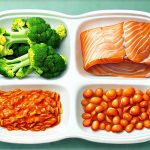Many people experience a fleeting discomfort when enjoying something cold – a brain freeze, perhaps, or a momentary tightening in the stomach. However, for others, this reaction is more than just a temporary annoyance; it’s a consistent sensitivity that can make even a sip of iced water problematic. This isn’t necessarily about temperature alone; it often points to a complex interplay between our digestive systems, nervous system responses, and individual sensitivities. Understanding why cold foods and beverages trigger discomfort requires exploring the nuances of how our bodies react to these stimuli, recognizing potential underlying factors, and developing strategies for managing this sensitivity effectively.
The sensation isn’t always localized to the stomach itself. It can manifest as bloating, cramping, nausea, or even diarrhea after consuming something cold. It’s crucial to differentiate between a normal physiological response – like the brief discomfort most of us feel with an ice cream headache – and a genuine sensitivity that disrupts daily life. This sensitivity isn’t necessarily indicative of a serious medical condition, but it does warrant attention, particularly if symptoms are persistent or severe. Identifying patterns in when and what triggers these reactions is the first step toward finding relief and potentially uncovering underlying causes. If you experience bathroom urgency after consuming cold beverages, it’s worth investigating further.
Understanding the Physiological Response
The human digestive system is remarkably sensitive, and temperature plays a significant role in its function. When we ingest something cold, it doesn’t just cool the stomach; it can cause a localized contraction of the gut muscles. This isn’t inherently bad – it’s part of normal digestion – but in individuals with sensitivity, this contraction may be more pronounced or prolonged, leading to discomfort. The vagus nerve, which connects the brain and gut, is heavily involved in these processes. Cold stimuli can activate the vagus nerve, triggering a cascade of responses that affect both digestive function and nervous system regulation.
The stomach naturally regulates its temperature to maintain optimal enzyme activity for digestion. Introducing cold substances forces the stomach to work harder to warm the contents back up, expending energy and potentially disrupting the digestive process. This rapid shift in temperature can be particularly problematic for individuals with existing digestive issues like Irritable Bowel Syndrome (IBS) or functional dyspepsia, where the gut is already more reactive. It’s also worth noting that individual variations in gut motility – the speed at which food moves through the digestive tract – can influence how cold foods are tolerated. Recognizing stomach pain patterns, even in children, can help identify triggers.
Furthermore, our perception of temperature isn’t just about physical sensation; it’s also influenced by psychological factors. Stress and anxiety can exacerbate digestive symptoms, including sensitivity to cold foods. A history of negative experiences with certain foods or beverages can also contribute to a conditioned response, where the mere thought of something cold triggers anticipatory discomfort. This highlights the importance of considering the whole picture – not just the physical aspects but also the emotional and psychological context surrounding food consumption. In some cases, it’s about determining the difference between sensitivity and more serious conditions like GERD.
Potential Underlying Causes & Conditions
Identifying the root cause of stomach sensitivity to cold foods can be complex. Often, it’s not a single factor but rather a combination of elements at play. One common contributor is heightened visceral hypersensitivity – an increased sensitivity to sensations within the gut. This means that even normal digestive processes may be perceived as painful or uncomfortable. Visceral hypersensitivity often occurs in conditions like IBS, where the nervous system misinterprets signals from the digestive tract.
Another possibility is a mild form of food intolerance rather than a full-blown allergy. Lactose intolerance, for example, can worsen symptoms after consuming cold dairy products because the body struggles to digest lactose efficiently, leading to fermentation and gas production in the gut. Similarly, sensitivities to other food components – like fructose or certain additives – could be exacerbated by cold temperatures. These intolerances don’t involve an immune response (like a true allergy) but can still cause significant discomfort.
Finally, pre-existing digestive conditions play a substantial role. Gastritis (inflammation of the stomach lining), peptic ulcers, and functional dyspepsia can all increase sensitivity to cold foods. In these cases, the underlying condition disrupts normal digestive function, making the stomach more vulnerable to temperature fluctuations. It’s important to remember that self-diagnosis is never recommended; if you suspect an underlying medical condition, consulting a healthcare professional is crucial for accurate diagnosis and appropriate treatment. Noise sensitivity can also play a role in exacerbating digestive discomfort.
Strategies for Managing Sensitivity
Managing sensitivity to cold foods requires a multi-faceted approach focused on identifying triggers, modifying dietary habits, and potentially incorporating lifestyle changes. A key first step is keeping a food diary. Record everything you eat and drink, along with any symptoms you experience – including the timing, severity, and location of discomfort. This can help pinpoint specific foods or beverages that are problematic.
Next, consider making gradual dietary adjustments:
1. Increase your intake of room-temperature or warm foods and beverages.
2. Avoid excessively cold drinks, especially on an empty stomach. Cramping is a common symptom to watch for.
3. Experiment with smaller portions to see if reducing the volume of cold food helps minimize symptoms.
4. Explore alternatives – for example, choosing dairy-free options if you suspect lactose intolerance.
Beyond diet, certain lifestyle modifications can also be beneficial:
* Manage stress levels through techniques like meditation or yoga.
* Practice mindful eating, paying attention to how your body responds to different foods.
* Stay hydrated by drinking water throughout the day, but opt for room-temperature water rather than ice-cold beverages.
* Regular gentle exercise can promote healthy digestion and reduce overall stress levels.
It’s important to emphasize that these are general strategies; what works best will vary from person to person. If symptoms persist despite dietary and lifestyle changes, or if they are severe enough to interfere with your daily life, seek professional medical advice. A healthcare provider can help rule out underlying medical conditions and recommend appropriate treatment options. It’s also important to note that cold food consumption can trigger similar reactions as cold drinks.


















